- Home
- P. D. James
A Taste for Death Page 34
A Taste for Death Read online
Page 34
“Mrs. Minns saw it the following afternoon. Since when has the London post arrived that promptly?”
“It’s perfectly possible, if she sent it first class.”
She persisted:
“It’s far more likely that he met Millicent Gentle that day and she gave it to him personally. I thought it would be interesting to know when and why.”
He looked at her and said:
“Could be. It’s just as likely that she signed it on the seventh, then left it for him at his constituency office.” Then he smiled.
“That’s what you and Mrs. Minns were having your girlish gossip about.”
He gave a slow, secret smile and she knew, with a spurt of irritation, that he had guessed about her temptation to conceal the evidence and was amused by it.
seven
Once back in the Rover and on their way to the Yard she suddenly said:
“I don’t understand it, religious experience.”
“You mean you don’t know how to categorize it.”
“You were brought up in it, I suppose. They indoctrinated you from the cradle: nursery prayers, school chapel, that sort of thing.”
She had seen the school chapel once on an outing to Windsor. It had impressed her. That, after all, was its purpose. She had felt interest, admiration, even awe, walking under that soaring fan vaulting. But it had still remained a building in which she had felt herself an alien, speaking to her of history, privilege, tradition, an affirmation that the rich, having inherited the earth, could hope to insure similar privileges in heaven. Someone had been playing the organ, and she had sat listening with pleasure to what she thought must have been a Bach cantata, but for her there had been no secret harmonies.
He said, his eyes on the road:
“I’m reasonably familiar with the external forms. Not as much as my father. Compulsory chapel every day for him, or so he claims.”
“I don’t even feel the need of it, religion, praying.”
“That’s perfectly natural. A lot of people don’t. You’re probably in the respectable majority. It’s a matter of temperament. What’s worrying you?”
“Nothing’s worrying me. But it’s odd about praying. Most people do pray, apparently. Someone did a survey about it. They pray even if they’re not sure who to. What about AD?”
“I don’t know what he feels the need of except his poetry, his job and his privacy. And probably in that order.”
“But you’ve worked with him before, I haven’t. Don’t you think that there’s something about this case that’s got under his skin?”
He looked at her as if he were sharing the car with a stranger, wondering just how much he could prudently confide. Then he said:
“Yes, yes I do.”
Something, Kate felt, had been achieved, a confidence, a trust established. She pressed further.
“What’s bugging him then?”
“What happened to Berowne in that church, I suppose. AD likes life to be rational. Odd for a poet, but there it is. This case isn’t, not altogether.”
“Have you talked to him about it, what happened in that church, I mean?”
“No. I did try once, but all I could get out of him was: ‘The real world is difficult enough, John. Let’s try to stay in it.’ So I shut my mouth, not being a fool.”
The light changed. She slipped out the clutch, the Rover moved quickly and smoothly away. They were meticulous in taking turns to drive. He yielded up the seat readily enough but like all good drivers he disliked being a passenger, and it was a matter of pride for her to match his fast competence. She knew that she was tolerated by him, respected even, but they didn’t really like each other. He accepted that the team needed a woman, but without being overtly chauvinistic, he would have preferred a man as partner. Her feeling towards him was more positive, compounded of resentment and antipathy. Some of it she knew was class resentment. But at heart there was a dislike more instinctive and fundamental. She found red-haired men physically unattractive. Whatever there was between them, it certainly wasn’t the antagonism of an unacknowledged sexuality. Dalgliesh, of course, knew that perfectly well. He made use of it as he made use of so much. For a moment she felt a spurt of active dislike of all men. I’m an oddity, she thought. How much would I care, really care, if Alan chucked me? Suppose I had the choice, promotion or Alan, my flat or Alan? She was given to these awkward self-examinations, imaginary choices, ethical dilemmas, nonetheless intriguing because she knew she would never have to confront them in real life.
She said:
“Do you believe that something really did happen to Berowne in that vestry?”
“It must have, mustn’t it? A man doesn’t chuck his job and change the direction of his whole life for nothing.”
“But was it real? OK, don’t ask me what I mean by real. Real in the sense this car is real, you’re real, I’m real. Was he deluded, drunk, drugged? Or did he really have, well, some kind of supernatural experience, I suppose?”
“It seems unlikely for a practising member of the good old C of E, which is what he’s supposed to have been. That’s the sort of thing you expect of characters in a Graham Greene novel.”
She said:
“You make it sound as if it were in poor taste, eccentric, a bit presumptuous.” She was silent for a moment and then asked:
“If you have a kid, will you have him christened?”
“Yes. Why do you ask?”
“So you believe in it, God, the Church, religion.”
“I didn’t say so.”
“Then why?”
“My family have been christened for four hundred years—longer, I suppose. Yours, too, I imagine. It doesn’t seem to have done us any harm. I don’t see why I should be the first to break the habit, not without some positive feelings against it, which I don’t happen to have.”
And wasn’t that, she thought, one of the things which Sarah Berowne had resented in her father, the ironic detachment which is too arrogant even to care. She said:
“So it’s a matter of class.”
He laughed:
“Everything with you is a matter of class. No, it’s a matter of tradition, of family piety, if you like.”
She said, carefully not looking at him:
“I’m hardly the person to talk to about family piety. I’m illegitimate, if you didn’t know.”
“No, I didn’t know.”
“Well, thank you for not telling me it isn’t important.”
He said:
“It only concerns one person. You. If you think it’s important, then OK, it has to be important.”
Suddenly she almost liked him. She glanced at the freckled face under a shock of red hair and tried to see him against the background of that college chapel. Then she thought of her own school. Ancroft Comprehensive had certainly had a religion all right, fashionable and, in a school with twenty different nationalities, expedient. It was anti-racism. You soon learned that you could get away with any amount of insubordination, indolence or stupidity if you were sound on this essential doctrine. It struck her that it was like any other religion: it meant what you wanted it to mean; it was easy to learn, a few platitudes, myths and slogans; it was intolerant, it gave you the excuse for occasional selective aggression, and you could make a moral virtue out of despising the people you disliked. Best of all, it cost nothing. She liked to pretend that this early indoctrination had absolutely nothing to do with the cold fury which seized her when she met its opposite, the obscene graffiti, the shouted insults, the terror of Asian families afraid to leave their barricaded homes. If you had to have a school ethos to give the illusion of togetherness, then for her money anti-racism was as good as any. And whatever she might think about its more absurd manifestations, it wasn’t likely to lead you to see visions in a dusty church.
eight
Dalgliesh had decided to drive alone on the Saturday afternoon to see the Nolans in their Surrey cottage. It was the kind of chore he would normall
y have entrusted to Massingham and Kate, or even to a detective sergeant and DC, and he could see the surprise in Massingham’s eyes when he told him that he had no need of a witness nor of anyone to take notes. The journey itself wasn’t unnecessary. If Berowne’s murder was linked to Theresa Nolan’s suicide, anything he could discover about the girl could be important. She was at present no more than a photograph in a police file, a pale, childish face under a nurse’s cap. He needed to animate that shadowy ghost with the living girl. But in intruding on her grandparents’ grief he could at least make it as easy as possible for them. One police officer must surely be more tolerable than two.
But there was, he knew, another reason for going himself and alone. He needed an hour or two of solitude and quietness, an excuse to get away from London, from his office, from the insistent telephone, from Massingham and the squad. He needed to escape from the Assistant Commissioner’s carefully unspoken criticism that he was making a mystery out of a tragic but unremarkable suicide and murder, that they were all wasting time on a manhunt without a quarry. He needed to escape, however briefly, from the clutter of his desk and the pressure of personalities, to see the case with clearer, unprejudiced eyes.
It was a warm, blustery day. Torn shreds of clouds dragged across a sky of clear azure blue and cast their frail shadows over the shorn autumnal fields. He was travelling via Cobham and Effingham, and once off the A3 he drove the Jaguar XJS into a lay-by and thrust open the car roof. After Cobham, with the wind tearing at his hair, he thought he could smell in its fitful gusts the rich, pine-scented woodsmoke of autumn. The narrow country roads, bleached white between the grass verges, wound through the Surrey woodlands which would suddenly clear to give him a wide view to the South Downs and Sussex. He found himself wishing that the road would straighten before his wheels and run empty, un-signposted, forever, that he could press down the accelerator and lose all his frustrations in the surge of power, that this rush of autumn-scented air screaming in his ears could cleanse his mind as well as his eyes of the colour of blood forever.
He half-dreaded his journey’s end, and it came unexpectedly quickly. He passed through Shere and found himself climbing a short hill; and there on the left-hand side of the road, bounded by oaks and silver birch, and separated from the road by a short garden, was an unremarkable Victorian cottage with its name, Weaver’s Cottage, painted on the white gate. About twenty yards beyond it the road straightened, and he drove the Jaguar gently onto the sandy verge. When he had turned off the engine the silence was absolute, birdless, and he sat for a moment, motionless and exhausted, as if he had come through some self-imposed ordeal.
He had telephoned, so he knew that they must be expecting him. But all the windows were fastened, there was no woodsmoke from the stack and the cottage had the secretive, oppressive air of a place not deserted but deliberately closed against the world. The front garden was untended, with none of the haphazard exuberance of the normal cottage garden. All the plants were in rows, chrysanthemums, Michaelmas daisies, dahlias, with between them half-denuded rows of vegetables. But the ground was unweeded and the small patch of lawn on each side of the door unmown and shaggy. There was an iron knocker in the form of a horseshoe, but no bell. He let it fall gently, guessing that they must have heard the car, must surely be expecting the knock, but it was a full minute before the door opened.
He said:
“Mrs. Nolan?” and took out his card, feeling, as he always did, like an importunate door-to-door salesman. She barely looked at it, but stood aside to let him in. She must, he thought, be nearer seventy than sixty, a small-boned woman with a sharp, anxious face. The exophthalmic eyes, so like her granddaughter’s, gazed into his with a look with which he was only too familiar: a mixture of apprehension, curiosity and then relief that at least he looked human. She was wearing a suit in blue and grey synthetic jersey, ill-fitting at the shoulders and puckered where she had shortened it at the hem. In her lapel was a round brooch of coloured stones in silver. It dragged at the thin jersey. He guessed that this wasn’t her usual wear for a Saturday afternoon, that she had dressed up for his visit. Perhaps she was a woman who dressed up to meet all life’s ordeals and tragedies: a small gesture of pride and defiance in the face of the unknown.
The square sitting room with its single window looked to him more typical of a London suburb than these deep country woods. It was neat, very clean, but characterless and rather dark. The original fireplace had been replaced by one of mock marble with a wooden overmantel and was furnished with an electric fire, one bar of which was burning. Two walls had been papered in a lurid mixture of roses and violets, and two with a plain paper in blue stripes. The thin, unlined curtains were hung with the patterned side towards the road so that the afternoon sunshine was filtered through a pattern of bulbous pink roses and ivy-clad latticework. There were two modern armchairs, one each side of the fireplace, and a square central table with four chairs. Against the far wall was a large television set, high on a trolley. Except for a copy of both the Radio Times and TV Times, there were no magazines and no books. The only picture was a garish print of the Sacred Heart over the fireplace.
Mrs. Nolan introduced her husband. He was sitting in the right-hand armchair, facing the window, a huge, gaunt man who responded to Dalgliesh’s greeting with a stiff nod but didn’t get up. His face was rigid. In the shaft of sunlight between the curtains its planes and angles looked as if they had been carved in oak. His left hand, crossed in his lap, was beating a ceaseless, involuntary tattoo.
Mrs. Nolan said:
“You’d like some tea, I daresay?”
He said:
“Very much, thank you, if it isn’t too much trouble,” and thought: I seem to have heard that question and spoken those words all my life.
She smiled and nodded as if satisfied, and bustled out. Dalgliesh thought: I say the conventional insincerities and she responds as if I were the one doing the favour. What is it about this job that makes people grateful that I can act like a human being?
The two men waited in silence, but the tea came very quickly. So that, he thought, accounted for the delay in opening the door. She had hurried at his knock to put on the kettle. They sat at the table in stiff formality, waiting while Albert Nolan raised himself stiffly from his chair and edged his way painfully into his seat. The effort set up a new spasm of shaking. Without speaking, his wife poured his tea and set the cup before him. He didn’t grasp it, but bent his head and slurped his tea noisily from the side. His wife didn’t even look at him. There was a half-cut cake which she said was walnut and marmalade, and she smiled again when Dalgliesh accepted a slice. It was dry and rather tasteless, rolling into a soft dough in his mouth. Small pellets of walnut lodged in his teeth and the occasional sliver of orange peel was sour to the tongue. He washed it down with a mouthful of strong, over-milked tea. Somewhere in the room a fly was making a loud intermittent buzz.
He said:
“I’m sorry that I have to trouble you, and I’m afraid it may be painful for you. As I explained on the telephone, I’m investigating the death of Sir Paul Berowne. A short time before he died he had an anonymous letter. It suggested that he might have had something to do with your granddaughter’s death. That’s why I’m here.”
Mrs. Nolan’s cup rattled in her saucer. She put both hands under the table like a well-behaved child at a party. Then she glanced at her husband. She said:
“Theresa took her own life. I thought you’d know that, sir.”
“We did know it. But anything which happened to Sir Paul in the last weeks of his life could be important, and one thing that happened was the arrival of that anonymous letter. We should like to know who sent it. You see, we think it probable that he was murdered.”
Mrs. Nolan said:
“Murdered? That letter wasn’t sent from this cottage, sir. God help us, we’ve no call to do such a thing.”
“I know that. We never for a moment thought that it was. But I wondered wh
ether your granddaughter ever talked to you about anyone, a close friend perhaps, someone who might have blamed Sir Paul for her death.”
Mrs. Nolan shook her head. She said:
“You mean, someone who might have killed him?”
“It’s a possibility we have to consider.”
“Who could there be? It doesn’t make sense. She hadn’t anyone else, only us, and we never laid hands on him, though God knows we were bitter enough.”
“Bitter against him?”
Suddenly her husband spoke:
“She got pregnant while she was in his house. And he knew where to find her body. How did he know? You tell me that.”
His voice was harsh, almost expressionless, but the words came out with such force that his body shook. Dalgliesh said:
“Sir Paul said at the inquest that your granddaughter spoke to him one night about her love of the woods. He thought that if she had decided to end her life, she might choose the only piece of wild woodland in central London.”
Mrs. Nolan said:
“We never sent that letter to him, sir. I did see him at the inquest. Dad didn’t go, but I thought one of us ought to be there. He just spoke to me, Sir Paul. He was kind really. Said he was sorry. Well, what else can people say?”
Mr. Nolan said:
“Sorry. Aye, I daresay.”
She turned to him:
“Dad, there’s no proof. And he was a married man. Theresa wouldn’t, not with a married man.”
“There’s no knowing what she might have done. Or him. What does it matter? She killed herself, didn’t she? First getting the baby, then the abortion, then suicide. What’s one more sin when you’ve got that on your conscience?”
Dalgliesh said gently:
“Can you tell me something about her? You brought her up, didn’t you?”
Mrs. Nolan turned to him almost eagerly.
“That’s right. She hadn’t anyone else. We only had the one child, her dad. Her mum died ten days after Theresa was born. She had appendicitis and the operation went wrong. A chance in a million, the doctor said.”

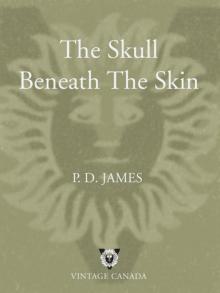 The Skull Beneath the Skin
The Skull Beneath the Skin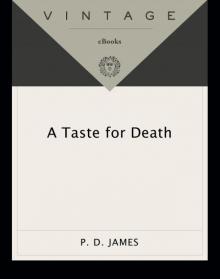 A Taste for Death
A Taste for Death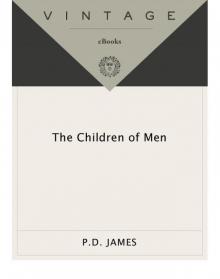 The Children of Men
The Children of Men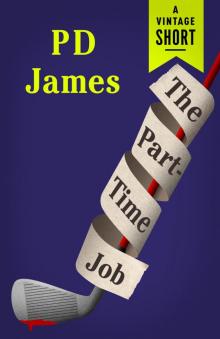 The Part-Time Job
The Part-Time Job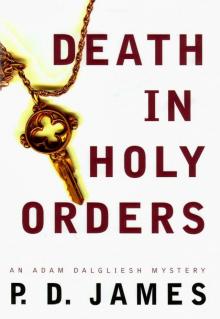 Death in Holy Orders
Death in Holy Orders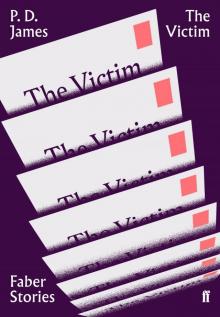 The Victim
The Victim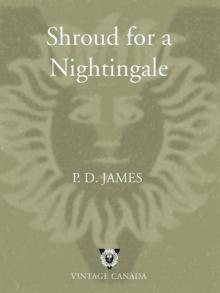 Shroud for a Nightingale
Shroud for a Nightingale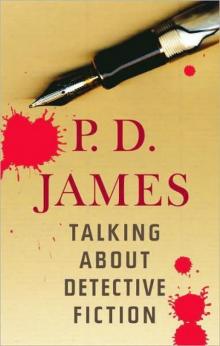 Talking about Detective Fiction
Talking about Detective Fiction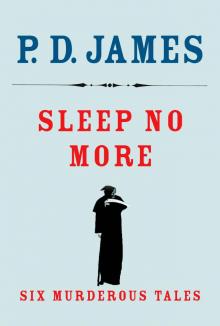 Sleep No More
Sleep No More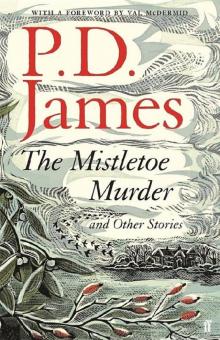 The Mistletoe Murder and Other Stories
The Mistletoe Murder and Other Stories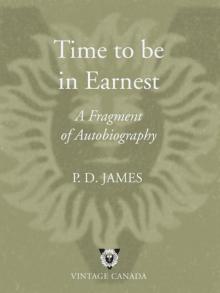 Time to Be in Earnest
Time to Be in Earnest Original Sin
Original Sin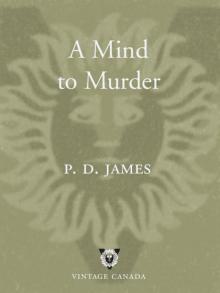 A Mind to Murder
A Mind to Murder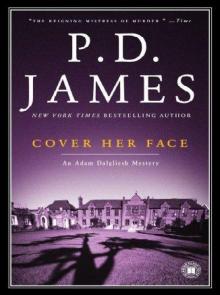 Cover Her Face
Cover Her Face Innocent Blood
Innocent Blood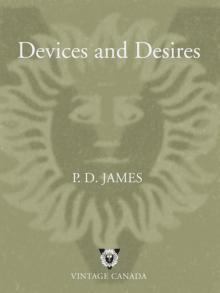 Devices and Desires
Devices and Desires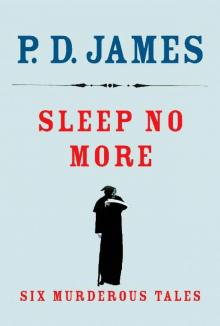 Sleep No More: Six Murderous Tales
Sleep No More: Six Murderous Tales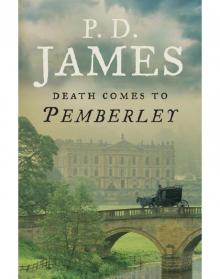 Death Comes to Pemberley
Death Comes to Pemberley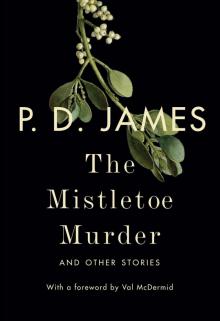 The Mistletoe Murder
The Mistletoe Murder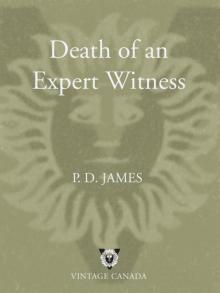 Death of an Expert Witness
Death of an Expert Witness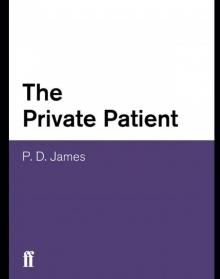 The Private Patient
The Private Patient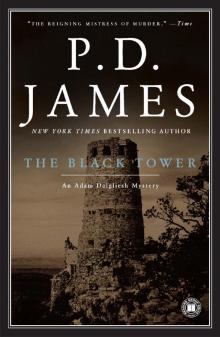 The Black Tower
The Black Tower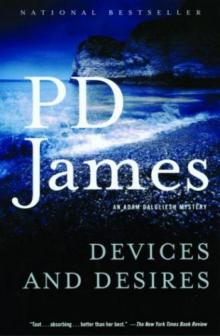 Devices & Desires - Dalgleish 08
Devices & Desires - Dalgleish 08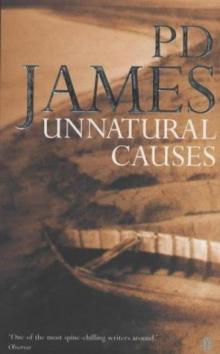 Unnatural Causes
Unnatural Causes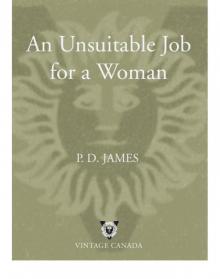 An Unsuitable Job for a Woman
An Unsuitable Job for a Woman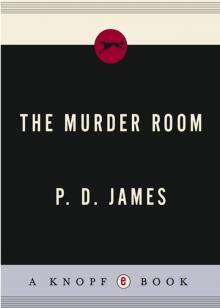 The Murder Room
The Murder Room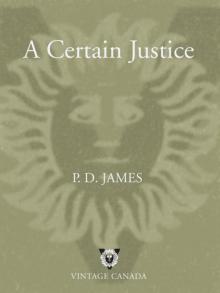 A Certain Justice
A Certain Justice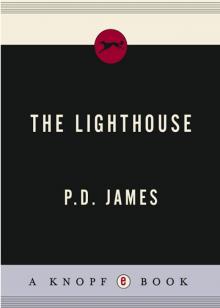 The Lighthouse
The Lighthouse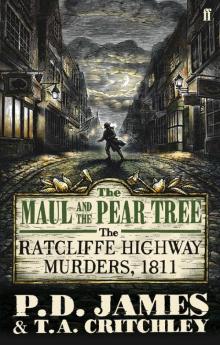 The Maul and the Pear Tree
The Maul and the Pear Tree